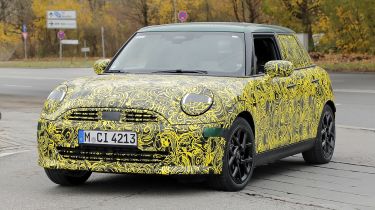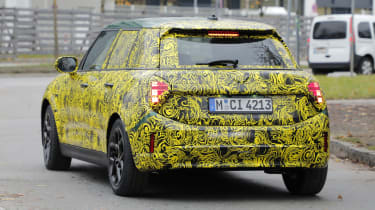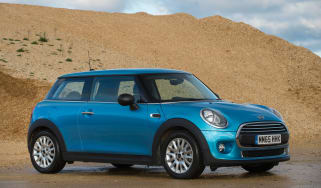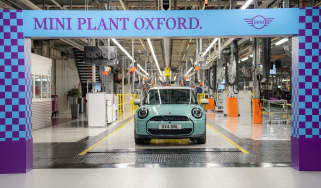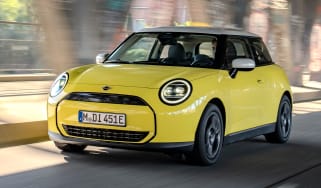New MINI Cooper testing takes next step as full reveal approaches
All-electric MINI will soon be joined by UK-built petrol version
We’ve seen the new, fourth-generation MINI Hatch already unveiled in all-electric Cooper EV guise but now attention has turned to the internal combustion-engined variant, which will arrive in early 2024.
We’ve caught the petrol-powered MINI testing before, but these latest spy shots give us a much better clue as to how the new model will look. Although it’ll broadly look similar to the MINI Cooper EV, the petrol MINI will be on a different platform and also unlike the Chinese-built electric model, the petrol offering will continue to be built in Oxford.
Having spotted it in three-door hatchback and cabriolet form already, it’s now the turn of the more practical five-door - something that won’t come to the electric version as the five-door MINI Aceman EV will occupy this niche.
As for these new spy shots, we can see the grille’s camouflage has been reduced, revealing a grille design not seen on the EV (for obvious cooling reasons). The front end still harks back to the retro-styled Frank Stephenson design of the first BMW MINI in the early 2000s with a thinner top grille that syncs up to the lower grille’s outline.
Unlike the Cooper EV, the ICE model retains wheel arch extensions although it’s unclear if they’ll be body colour contrasting as they’ve typically been before. The traditional ‘floating roof’ design will definitely continue on, however, with the pillars hidden away. The rear of the previous test cars has used the third-generation MINI tail lights but here we see the new style of rear lights that have already been unveiled on the EV.
We’ve previously caught the Cooper S hot hatch variant on the road and it sported single-exit central exhaust, as opposed the the central dual-tip arrangement that the previous Cooper S and JCW models have featured. As with previous Cooper S models, we expect bespoke wheel designs, new front and rear bumpers and a rear spoiler.
The new Cooper won’t get the FAAR platform utilised on the EV model - despite that architecture’s being able to accommodate ICE powertrains. Instead, the ICE model should use a revised version of the current UKL1 platform.
We also expect to see the current range of engines carried over with a mix of turbocharged three- and four-cylinder units. We’ve seen JCW trim levels of the new EV and this range-topping variant is likely to be retained on the petrol model, potentially with the same 228bhp, 2.0-litre turbocharged four-cylinder.
Check out the latest MINI news and reviews here...
Find a car with the experts

